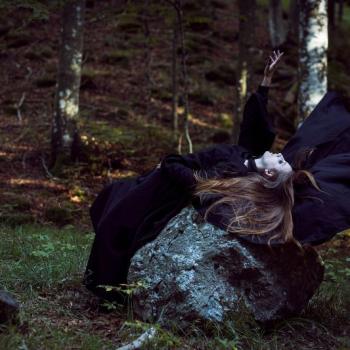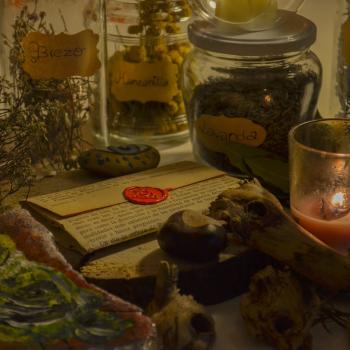Baneful magick (cursing, binding, banishing) is a topic which can cause heated conversation among those who practice spellcraft. Last year, I led a discussion group raising the subject. Here are some of the questions asked.
What do people consider to be “baneful?” Do binding, banishing and cursing all fit into this category? Is there value in performing baneful magick? Does casting an “innocuous” spell (for a job, love, et al), which might prevent an unknown person from getting what they need in favor of the one for whom the spell was cast, count as baneful magick?

Baneful Magick is defined as any spell, ritual or “craft” meant to cause “harm.”
What does it mean to cause “harm”? This can be understood as anything creating injury–hurt, suffering, distress… (physical/mental/spiritual)– to a person, place, animal, etc. Some Wiccans in the discussion group said to banish or bind is acceptable so long as the Rede’s “harm none” is honored. Cursing is a definite no-no because “harm” would be caused. However, one person stated any form of binding or banishing would fall under the heading of harm, right along with cursing. They maintained that magick should always be practiced for the “good” of others. No one should play “judge and jury.”
Here’s the thing. Consider the question about the love/job/whatever spell. In the case of a job spell, one must presume the magick is putting favor upon one individual above all others. Does this not bring “harm” to those other people who also need a job? They have bills, families, needs. There are people who are desparate for employment. Some magickal practitioners will add the caveat “so long as it harms none” to their spell to honor the Rede. But can spellcasting, which is meant to bring our intentions (needs/wants/desires) into the universe, ever be truly inoffensive (not objectionable or harmful) when the potential to effect others remains? This begs the question: Is any form of magick benign? An important consideration for anyone who practices the Craft.

Some believe baneful magick begets negative blowback.
Several people in the group said they will not curse because of the Three-fold Law. Believing the energy they put into the universe returns at three times the strength. In other words, in cursing another person they might bring a worse condition upon themselves. So really, it comes down to not wanting to hit themselves with bad juju or karma.
The idea of “karma” is best defined ( in Hinduism and Buddhism) as the total of a person’s actions in this life and within previous lives. Karma decides what comes in the next life for those who believe in it. In my opinion, the Three-fold Law is more akin to “reaping what you sow” (a Christian concept).
For my part, I have not experienced this in magickal practice. In other words, I’ve not seen or experienced the Three-fold Law effect in regard to spellcraft. Where I have seen such principles (whether you call it sowing-reaping or Three-fold Law) at work is in how one lives their life. Their decisions and how those choices effect their personal sphere of influence. Take from that what you will.
Cursing seen as “Black” Magick.
Cursing has been labled as “black” magick. For many, this indicates magick which is evil or bad. According to Wikipedia, black magick is that which is done for evil (the opposite of good) or selfish purposes. Black magick or cursing is often viewed as malicious. For some, magick or ritual practice of any kind is “black” and associated with “The Devil” or “Satan.”
Not long ago, while my family and I were teaching a class on divination at a Pagan event, a participant asked if Tarot and other divinatory devices are “black magick.” The person was new to the Craft and still overcoming fears instilled from a deeply religious past. I believe those who claim to practice “white” magick, or who shun the idea of baneful magick, may be operating under a similar (albeit subconscious) fear.
The idea is that while “black” magick is vile, “white” magick is pure. One can say to an unapproving friend/family member, “See. I only practice good magick. There is nothing bad about what I do.” Can one style of magick be more noble or just than another? Or is magick curious shades of gray, where cursing might be as valuable a tool in the magickal practitioner’s spellkit as cleansing, healing, and blessing.

For me, yes. Baneful Magick, can be useful when needed.
Every magickal practitioner needs to determine their own mind on what defines baneful magick. Human beings are complicated, as are the intentions with which they set about their spellcraft. In my opinion, magick is neutral and all forms of spellcasting has its reason, time, or place. What spells are cast is up to the Witch, Wiccan or magickal practitioner and is dependent on the situation, need or desire.
What it comes down to, for me, is not a universal “law” or a guiding tenet (unless one is part of a tradition or belief system which has those things) but rather the ethics of the Witch, Wiccan, or magickal practitioner.
Baneful magick has its place in the Craft of the Wise, as it does in other forms of magickal paths and religions. In my practice, I can both curse and cleanse. Bind and release. Banish and call. How I choose to apply that knowledge is on me to decide.
What I believe about Baneful Magick and when to apply it:
To bind — is the equivalent act of a restraining order on someone who is entering the scary realm of troublesome or has the potential to or has been actively causing emotional/spiritual/physical harm (there’s that word again).
To banish — is the equivalent of either a relocation program or a jail sentence (depending on intention). The subject of the banishment is being “sent away” or “contained” for the protection of oneself or others. And once you take action by casting a banishment that individual becomes your spiritual “responsibility”. In other words, maintaining wards.
To curse — is to punish someone causing grievous harm (emotional/physical/spiritual) and is an action which should not be taken lightly or on a whim because you or someone you know is pissed off. Cursing is a last resort action.













